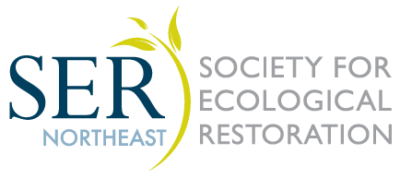Below is the schedule for the breakout sessions.
Abstracts and speaker biographies can be found here (or through the above dropdown menu).
The overview schedule for the full day is here (or through the above dropdown menu).
|
Morning Breakout Sessions |
||||||
|
Session A: Setting Appropriate Targets for Restoration |
Session B: Working with People for Restoration 1 |
Session C: Restoration of Native Plants |
||||
|
Moderators: Denise Burchsted & Kristopher Houle |
Moderators: Chris Polatin & Ryan Crehan |
Moderators: Tom Touchet & Aisling O’Shea |
||||
|
Squamscott Room |
Piscataqua Room |
Cocheco Room |
||||
|
Author |
Title |
Author |
Title |
Author |
Title |
|
|
10:10-10:30 |
Kristopher |
A |
Nick |
Introduction |
Jeffrey |
Applying |
|
10:30-10:50 |
Paul |
Comparing |
Derek Pelletier, Ramboll Envion |
Valuing |
Jessica |
Restoring |
|
10:50-11:10 |
Roy Schiff, PhD, Milone & MacBroom |
Flood |
Shannon |
Understanding |
Sara Wigginton, URI |
Evolving |
|
11:10-11:30 |
Denise |
The Myth |
Ryan Crehan, US Fish & Wildlife Service |
Schoolyard
|
Jessica |
Hardy Kiwi (Actinidia arguta) Control Project at Kennedy Park and Pleasant Valley Sanctuary, Lenox, Mass. |
|
Afternoon Breakout Sessions #1 |
|||||||
|
Session D: Coastal Restoration |
Session E: Freshwater Restoration 1: Case Studies & Tech Guidance |
Session F: Field Studies & Models of Ecosystem Services |
Working with People for Restoration—Workshop |
||||
|
Moderators: Derrick Alcott & Joanna Carey |
Moderators: Kristopher Houle and Ryan Crehan |
Moderator: |
|||||
|
Squamscott Room |
Piscataqua Room |
Cocheco Room |
Huddleston |
||||
|
Author |
Title |
Author |
Title |
Author |
Title |
Author & Title |
|
|
1:00-1:20 |
Derrick Alcott, UMass |
Fish Passage and Movement Behavior at a Tide Gate Prior to |
Alex Hackman, Mass. Div. of Ecological Restoration |
A Cranberry Farm Transformation: Initial Outcomes and Lessons From the Tidmarsh Wetland Restoration Project |
Simone Pereira |
Sediments |
Rachel Bouvier, PhD, rbouvier consulting
“The Price of Everything and the Value of Nothing”: What Economists Can (and Can’t) Tell Us About Ecological Restoration
|
|
1:20-1:40 |
Steven Riberdy, GZA GeoEnviron-mental |
Vegetative |
Jill |
Nissitissit River Response to the Removal of Turner Dam |
Neal Price,
|
Using a |
|
|
1:40-2:00 |
Devin Batchelder, UNH |
A Hostile Takeover in the Salt Marsh: Invasive Snail Threatens Essential Plant Species |
Steven Landry, NH Dept. of Env. Services |
It was Never about the Fish … The Maxwell Pond Dam Removal and Black Brook Restoration Success Story |
Peter Zaidel, UMass |
Assessing the Potential for Dam Removal to Restore Natural Thermal and Dissolved Oxygen Regimes |
|
|
2:00-2:20 |
David Burdick, PhD, UNH Jackson Estuarine Laboratory |
Removing Legacy Effects of Ditching from Salt Marshes Increases Resilience to Sea Level Rise |
James Turek, NOAA |
Nature-Like Fishway Design Guidance: Application to the Northeast Region |
Gillian Davies, BSC Group |
Using and Interpreting IRIS Tubes to Assess Wetland Mitigation Success in Created Wetlands |
|
|
Afternoon Sessions #2 |
||||||
|
Session G: Landscape-Scale |
Session H: Freshwater |
Session I: Working with People for Restoration 2 |
||||
|
Moderators: Aaron Schlechter & Aisling O’Shea |
Moderators: |
Moderators: Chris Polatin & Joanna Carey |
||||
|
Squamscott Room |
Piscataqua Room |
Cocheco Room |
||||
|
Author |
Title |
Author |
Title |
Author |
Title |
|
|
2:40-3:00 |
Karen Lombard, The |
Preserve Management Planning to Improve Climate Resilience |
John Field, PhD, Field Geology Services |
Using Large Wood to Restore River Function |
Malin Clyde, UNH Cooperative Extension |
Community Engagement in Ecological Restoration: Working with Volunteers in Stewardship and Citizen Science |
|
3:00-3:20 |
Thomas Ballestero, PhD, UNH |
Hydraulic and AOP Characteristics of Problem Culverts |
Jim MacCartney, River Solutions, LLC |
Use and Effects of Self-Stabilizing Wood on Channel Processes and Aquatic Habitat |
Emily Vogler, PhD, URI |
A Framework for Coastal Ecology: Sculptural Forms as Infrastructure for Coastal Resilience and Education |
|
3:20-3:40 |
Mark Carabetta, Milone & MacBroom |
Down Along the Binnekill: Using Flood Inundation Mapping and Stream Power to Identify Risks and Set Conservation Priorities |
Joel DeStasio & Colin Lawson, Trout Unlimited |
Restoring Instream Habitat and Improving Floodplain Resiliency Using Large Wood |
Glorianna Davenport, MIT Media Lab |
Living Observatory: Documenting Ecological Change over Time across the Tidmarsh Farms Restoration Project |
|
3:40-4:00 |
Rachel Stevens, Great Bay National Estuarine Research Reserve and NH Fish and Game Department |
No Management is Active Management: A (Re) Evaluation of New Hampshire Salt Marsh Restoration and Conservation Opportunities in a Changing Climate |
Douglas Thompson, PhD, Conn. College |
Large Wood Controls on Channel Morphology and Use of Wood Additions for River Restoration |
||
